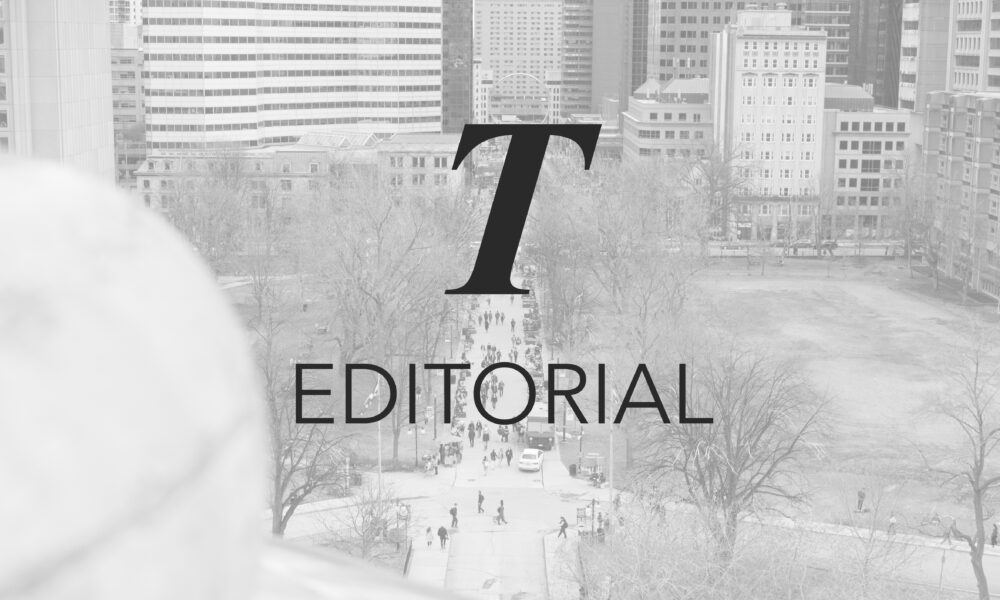On March 21, the Université du Québec à Montréal (UQAÀM) became the first Canadian university to have all of its student unions adopt Boycott, Divestment, and Sanctions (BDS) mandates. This final vote follows more than six years of tireless activism from Solidarity for Palestinian Human Rights UQAAM (SDHPP). In comparison, McGill’s history regarding BDS is fraught: After a 2016 BDS motion passed with 58 per cent of non-abstaining McGill student voters’ support, the Judicial Board ruled against its adoption, citing that it would be unconstitutional for the Students’ Society of McGill University (SSMU) to take positions against specific countries. The echoes of this decision resound in the legal and constitutional actions against two other democratically-elected policies, the 2022 Palestine Solidarity Policy and the 2023 Policy Against Genocide in Palestine. UQAÀM’s vote must be a signal to students to continue mobilizing, acting in solidarity with Palestine, and ending McGill’s complicity with Israel’s siege on Gaza.
Generations of McGill students have worked to reach a consensus on anti-colonial struggle, at home and abroad. Protests continue to garner support, with pro-Palestine students, staff, and faculty speaking up against McGill’s investments in corporations that fuel genocide and partnerships with universities that actively contribute to the military-industrial complex. UQAÀM’s student activists’ historic policy victory serves as a broader framework for change—a message that our tuition dollars make us complicit, and that as students we can and must reshape this university.
BDS as a movement democratizes the university and upends the normalization of complicity in the form of academic and economic investment in genocide and colonialism. Years of Black and African-led mobilizations in the 1980s pushed McGill to become the first Canadian university that divested from apartheid South Africa. This recent history, alongside the 11-year struggle to divest from direct holdings in Carbon Underground 200 fossil fuel companies, demonstrates student power and affirms that true learning can only exist alongside striving for self-determination, human rights, and peace. The 2021 Divest for Human Rights Campaign asserted that students’ efforts for environmental justice, racial justice, and decolonization begin on campus. On unceded land and on the exploitation of enslaved Black and Indigenous children, our university’s founding has informed this ongoing fight against white supremacy and settler colonialism. Grounding Palestinian struggle on campus in these histories allows us to propel our solidarity and understand the limits of institutional recognition.
In their efforts to push for the adoption of pro-Palestine policies, activists from Solidarity for Palestinian Human Rights (SPHR) at McGill to Law Students for Palestine have worked inside and against the institution. When the injunction in November halted the Policy Against Genocide in Palestine, students continued to mobilize on campus against the ongoing genocide in Gaza. Student activists have increasingly organized successful direct action through protests in university buildings, the Bronfman blockade, and the courageous hunger strike. When their activism upsets daily procedure on campus, history emerges in popular education on the ground and it becomes impossible to view the university as apolitical. These actions necessarily refute the university’s misinformation and its monopoly on the interpretation of events. What the administration sees as disruption and hostility is the invocation of liberation from students. The chants, teachings, and care integral to these actions generate community amid the violence, recognizing that another university and another world is possible. The university acts from a powerful position of fear, weaponizing students and workers against one another by requesting police intervention and attempting to diminish student activism. To counter the administration’s frantic fear-mongering in every email, condemnation, scab effort, and police call, activism on this campus only grows louder and cuts across constructed divides.
Calls for a BDS policy highlight institutional failures across the board. Unionizing efforts from Law, Education, and Arts professors alongside the Association of Graduate Students Employed at McGill (AGSEM) have enlivened the possibilities of our university. Struggles interlink with one another when AGSEM shows support for Palestine and the hunger strikers raise awareness of the teaching assistants and the Kanien’keha:ka Kahnistensera (Mohawk Mothers). McGill’s role in exploiting workers and dispossessing Indigenous peoples and their land cannot be the same. The administration’s disregard for Palestinian and Arab students and suppression of protest reveals that this community will rise up, demanding the end to unbearable forms of oppression.
Our time at McGill is brief. Boycotting, divesting, and sanctioning Israel, calling for a ceasefire and Palestinian liberation are three important steps that will become intergenerational struggles. As this academic year ends, these struggles do not. Acting in solidarity, mobilizing on the ground, and carrying forward activist memory will allow us to pursue justice here and abroad, now and in the future.








